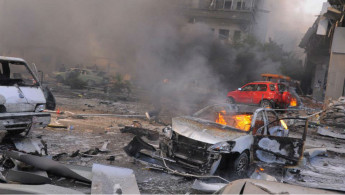Al-Qaeda affiliate mounts 'suicide offensive' on Homs regime headquarters
Two suicide bombs on two Syrian regime security headquarters in Homs killed more than 30 regime soldiers on Saturday - including the local security chief.
Fighters belonging to the Islamist organisation, Jabhat Fateh al-Sham (JFS), battled with regime forces in intensive street fighting for almost two hours prior to the attacks, pushing their way steadily towards the headquarters.
"The blasts targeted a military security building and a branch of the State Security," said Mohammad Sibai, a member of the Homs Media Centre.
Jabhat Fateh al-Sham were previously known as al-Nusra Front, before they changed their name in a radical rebranding exercise last year. They have been linked to al-Qaeda in Syria and share a similar ideology.
General Hassan Daaboul, the security chief for the area, was confirmed killed in the attack, in addition to Brigadier Ibrahim Darwish.
The extremist fighters overcame regime fighters at roadside checkpoints in the al-Ghouta and al-Mahatta neighbourhoods in order to allow the suicide bombers to reach the security buildings in the centre.
 |
The Islamic State in the past -- rather than the Nusra Front -- carried out suicide attacks on the Zahra district of Homs, considered a loyalist part of the city. |  |
The Islamic State in the past -- rather than the Nusra Front -- carried out suicide attacks on the Zahra district of Homs, considered a loyalist part of the city.
Homs was one of the first cities to rise up against Assad's regime in 2011, after protesters who took to the streets were met with brutal and violent suppression by regime forces.The Syrian conflict began when the Baath regime, in power since 1963 led by Assad, responded with military force to peaceful protests demanding democratic reforms during the Arab Spring wave of uprisings, triggering an armed rebellion fuelled by mass defections from the Syrian army.
According to independent monitors, hundreds of thousands of civilians have been killed in the war, mostly by the regime and its powerful allies, and millions have been displaced both inside and outside of Syria.
The brutal tactics pursued mainly by the regime, which have included the use of chemical weapons, sieges, mass executions and torture against civilians have led to war crimes investigations.





 Follow the Middle East's top stories in English at The New Arab on Google News
Follow the Middle East's top stories in English at The New Arab on Google News
![Netanyahu furiously denounced the ICC [Getty]](/sites/default/files/styles/image_330x185/public/2024-11/GettyImages-2169352575.jpg?h=199d8c1f&itok=-vRiruf5)
![Both Hamas and the Palestinian Authority welcomed the ICC arrest warrants [Getty]](/sites/default/files/styles/image_330x185/public/2024-11/GettyImages-2178351173.jpg?h=199d8c1f&itok=TV858iVg)
